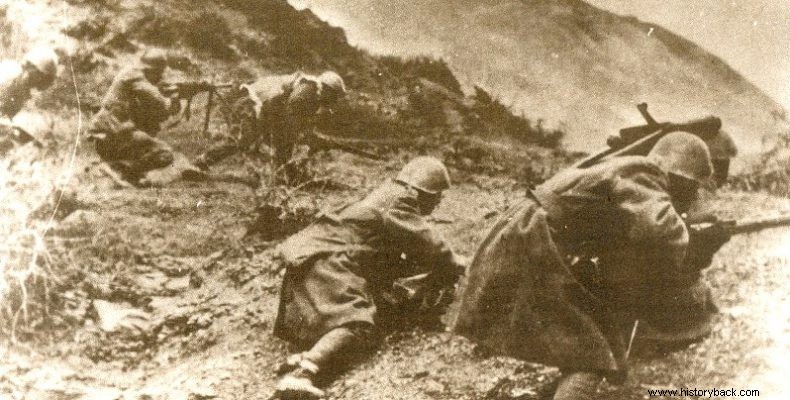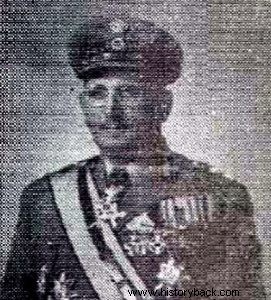
At the beginning of March 1941, the Greek Army was in front of Tepeleni. The 1st Army Corps had ordered the famous II Infantry Division (MP) of Lt. Gen. Lavdas to clear the Goliko mountain complex with the aim of overtaking the Lekli location. II MP was reinforced with the 11th Infantry Regiment (2 battalions). This regiment would attack together with the 34th Infantry Regiment, the Piraeus Regiment, commanded by Colonel Alexandros Tsigounis (or Tsigounis).
The two Greek regiments would go out, the 11th from the sector of Hormova, and the 34th from the sector of Malesova. At 06.15 on March 7, the III/11th Infantry Battalion (TP), under the lieutenant colonel Pausanias Katsotas charged, after a 15-minute artillery preparation and with the lance captured the Dodi peak of hill 1615,capturing 220 Italian prisoners . But then the battalion was pinned down due to the overwhelming fire of the Italian artillery.
Another attempt against Hill 556 failed and the battalion was forced to withdraw due to enemy pressure. The I/11 TP swooped in 15 minutes after the III/11 and after a 30-minute hand-to-hand fight, captured the unnamed hill north-east of Leckley, capturing 150 Italian prisoners. But again the Italians reacted furiously and the battalion was also pinned down. So one leg of the attack had failed.
Efodes Piraeus
The 3rd Regiment launched its attack at 15.00 on 7 March, setting off, after a 20-minute artillery preparation, with the II/34TP against Hill 739 and the I/34TP against Hill Kontra. The I/34TP was initially in a difficult position receiving fire from hill 1615. But the II/34TP also ran into a deadly barrier and stopped. Thus all four Greek battalions were pinned down.
The next day the 11th Regiment did not move. However, the 34th repeated the attack early in the morning, aiming in principle at 739. The Italians fought furiously. Greeks and Italians were within breathing distance, exchanging grenades, stones and curses! Finally after a long conflict the Italians "broke" and the men of the 34th captured the 739 destroying the Italian battalion holding it. Of this battalion, about 300, together with its commander, were captured, the rest were killed or fled.
The victory was given to the Greeks by an unfortunately unnamed mortar platoon member who, despite the fact that Greeks and Italians were almost in contact, fired so well that he dispersed the defending Italians without harming the Greeks ! Under cover of his fire the men of the 34th Regiment made the final leap against the enemy. This is how an eyewitness, the artillery commander of the II MP, colonel Christos Mantas, describes the battle:"The fight before 739 was fierce throughout the day. By 16.00 the friendly units were so close to the enemy positions that no one could distinguish ours from the Italian forces.
"The times of Achilles and Hector were revived at that moment. Our infantrymen were fighting with their grenades Italians occupying higher positions, addressing them with threats and curses. The Italians responded similarly. I will never forget the team of Sergeant Foukas with the Papadakis brothers from Piraeus who, with unfathomable heroism, reached 25m. from the enemy positions although they were under fire from every Italian weapon and especially from holmes.
"An Italian, standing, was fighting furiously, throwing dozens of grenades, until one of our shells blew him into the air. The battle was a great sight at that moment. With heartbreak I watched the slaughter of our infantry and urged my captains to fire as much as possible - because with the safety belt it would not be possible to fire without danger to the friendly forces.
"At 3:00 p.m. the call "AIR" was heard and after a while we see the Italians in 739 laying down their weapons. What had happened; While the fight was raging at 739, the I/34TP, taking advantage of the enemy's frontal employment, penetrated to his south and southwest and surrounded the Italian forces! The victory was great, but it was paid for with a lot of Greek blood. The 34th had 63 killed and 205 wounded in the two-day attack, answering some who insist to this day that the Italians did not fight in 1940-41.

The commander of the 34th Regiment Al. Tsingounis as A/GES.
